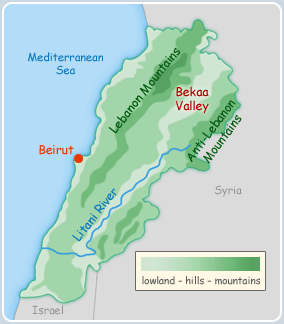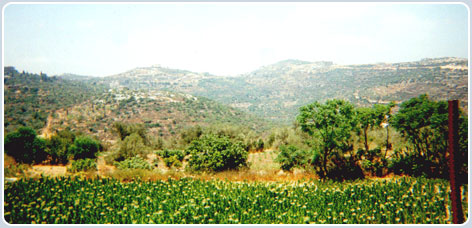|
Lebanon�s breadbasket
Farming remains a way of life for many Lebanese families, and agricultural products still generate 12% of the country�s GDP. Bekaa valley is Lebanon�s most important farming region - 40% of households run small family farms here.
Main crops in Bekaa Valley
| |
Approximate area in hectares |
| Cereals (wheat, barley) |
300,000 |
| Vegetables (potatoes, tomatoes, cucumbers) |
260,000 |
| Fruit (citrus, grapes, apples, apricots) |
220,000 |
| �Industrial crops� (sugar beet, tobacco) |
150,000 |
| Olives |
32,000 |
| Bekaa Valley lies about 1,000 metres above sea level and separates Lebanon�s two mountain ranges. It is actually an extension of the Great African Rift Valley. Visit Geoscience Animations to find out how movements of the earth's plates formed the Great African Rift Valley. |
 |

The Bible described Lebanon as "the land of milk and honey" because of its rich farmland, and in Roman times, Bekaa Valley was known as �the breadbasket of the Empire�.
© Abdu Ezzedine |
Environmental Pressures
Thanks to the Mediterranean climate Bekaa Valley receives between 200-800 mm of rainfall a year, yet water shortages are a growing problem.
Bekaa valley lies in the rain shadow of the Lebanon mountain range, shielded from the heavy rain and snow that fall in the mountains to the west. In the valley most of the rain falls in heavy showers between November and March, whilst it almost never rains between June and October. At this time of year temperatures can reach 35°C.
The farming sector is by far the biggest consumer of water. During the summer farmers rely on irrigation systems to prevent their crops from withering in the heat. But many irrigation channels are inefficient, wasting water. Untreated sewage and other waste add to the problem by polluting precious water resources.
The use of pesticides like methyl bromide presents another threat to the environment. Farmers intensively growing strawberries and tomatoes in greenhouses inject methyl bromide gas into the soil to kill off pests. But methyl bromide is banned in many countries, including neighbouring Syria. When released into the atmosphere it is dangerous to human health and depletes the ozone layer. In order to meet international standards so they can sell their crops on world markets, Bekaa�s greenhouse farmers are phasing out the use of methyl bromide.
Wine and Weed
 |
At the end of the civil war in 1990, farmers revived a tradition that goes back 6,000 years � wine making. Vineyards are well suited to the valley�s altitude and climate. Young vines are well watered during the winter, and the grapes ripen easily during the warm, sunny summer. There are now a dozen wineries in Bekaa Valley, producing over six million bottles a year. Two million bottles are exported, mainly to France, and an average of two new wineries are opening every year. And like other wine regions of the world, wine tasting has become an important tourist activity in the valley. |
 Since the withdrawal of Syrian troops in March 2005, some farmers have started another revival, replanting their fields with cannabis seeds. Cannabis was grown widely in Bekaa Valley during the civil war years when rural Lebanon was effectively lawless. In the 1980s bumper harvests from Bekaa Valley supplied most of Europe�s hashish, making profits of about £300 million a year. Since the withdrawal of Syrian troops in March 2005, some farmers have started another revival, replanting their fields with cannabis seeds. Cannabis was grown widely in Bekaa Valley during the civil war years when rural Lebanon was effectively lawless. In the 1980s bumper harvests from Bekaa Valley supplied most of Europe�s hashish, making profits of about £300 million a year.
Under pressure from the US government, the occupying Syrians used to raid and destroy the cannabis fields. Many farmers are still serving long terms in prison. The UN promised aid to farmers to help them get started in growing alternative crops, but many of these funds never materialised. Without cannabis cultivation some farmers found it difficult to make ends meet - "in the days of hashish we were so happy. I once owned a car, but now I own a cow".
| Some Bekaa farmers are again finding cannabis cultivation irresistible. So long as they don�t get caught, farmers can sell a truckload of 1,500 kg of cannabis for about £1,000 compared to about £120 for the same quantity of wheat. Worried about the cannabis revival and the damage it might do to the country�s reputation, the government has used helicopters to drop leaflets threatening long prison sentences for farmers that take up cannabis farming.
But some are prepared to take the risk. "We hear their threats, but they mean nothing", commented one farmer. For them, cannabis farming is the quickest route out of poverty.
|

"We know drugs are haram (forbidden by God), but isn�t starving your children haram, too?"
© Rex Features |
Farmers in Colombia that cultivate coca, the raw material for cocaine, have also been encouraged to grow alternative crops. Visit Global Eye Autumn 2004 to find out more. |













